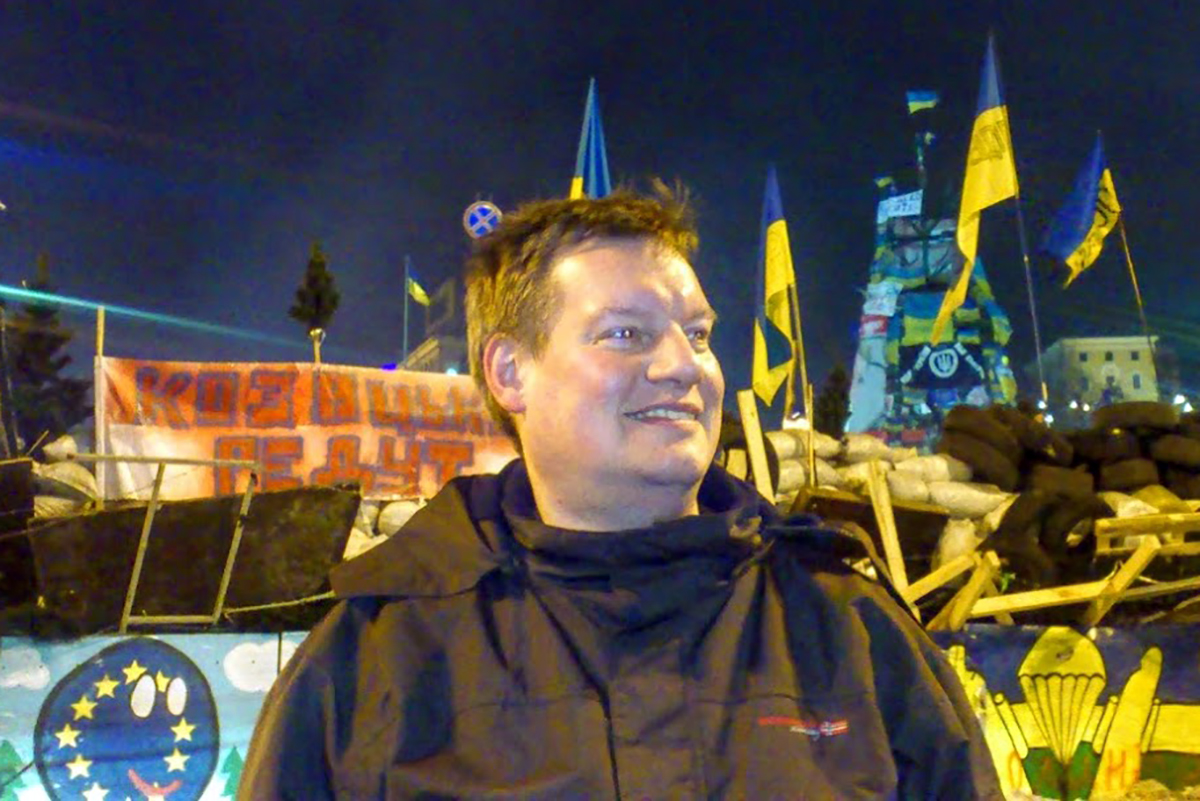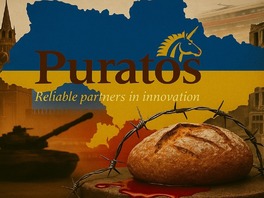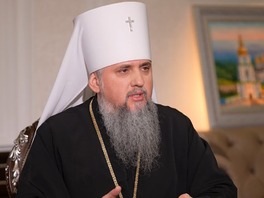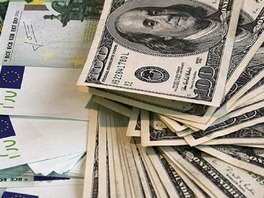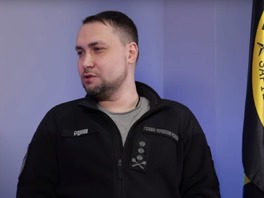On February 20, Ukraine marks the Day of the Heavenly Hundred Heroes. The memorable date is dedicated to the fallen participants of the Revolution of Dignity. Johannes Wamberg Andersen, a journalist, historian and human rights activist from Copenhagen, shared his impressions from Maidan and talked about the tragedies that happened during the Revolution of Dignity.
- How did it happen that you became a member of the Revolution of Dignity? Did you come here on purpose?
- I became interested in Ukraine back in 1999. I was an intern at the Danish Embassy and wrote reports for our Foreign Ministry. My first report was about Pavlo Lazarenko (Prime Minister of Ukraine, who was later sentenced to more than 8 years of imprisonment for fraud and money laundering - "Apostrophe") leaving Borispol. As soon as the MPs in Verkhovna Rada found out that he had gotten off the ground, they took away his immunity. I am a Danish historian, a journalist, and I have no Ukrainian roots. However, I started worrying about Ukraine and became excited about the possibility of establishing democracy, the rule of law. Before that, I was widely interested in the post-Soviet space and the transition from the Soviet Union to the market economy.
I have lived and worked in Ukraine - with some breaks - since the Orange Revolution. As Russia had already established a certain amount of authoritarianism under Putin's leadership at that time, it was very important for Europe to see how things would go in Ukraine. These are not small Baltic countries, which have always differed from the Russian Empire. Ukraine is very big. It's a Slavic root part of this empire. If we could establish true democracy, it would be a significant success for the whole of Europe.
- When did you realize that there would be a revolution in the country?
- In 2013, I was worried. I even felt that everything was kind of "clutched". I felt the depression in society. Yanukovych's entourage was not just corrupt, they're bandits. They increasingly "squeezed" the society, and even small oligarchs started to suffer. It was as if all the corrupt officials, the abusers, decided to steal, as everyone was awaiting the association with the EU and were afraid of it getting harder to launder money.
I participated in monitoring the criminal cases against Yulia Tymoshenko and Yuriy Lutsenko in 2011. Our reports led to the fact that the EU said it could not conclude an association agreement due to Ukrainian legislation not complying with European norms. Yanukovych was given two years to implement some reforms in the legal field. It was Andriy Portnov's responsible in President Yanukovych's administration.
When the demonstrations began on Maidan, I - an outsider, not a Ukrainian - was delighted, because finally the Ukrainians gave some kind of resistance to this lawlessness. For years I was tormented by the fact that the Ukrainians were "bending down". I understand that history has accustomed me to it, because everyone who raised his head and was proud, had his head cut off - during the Holodomor, Stalin's campaign against UPA and the similar. But it was very exciting when someone got up and rebelled.
- You've been on Maidan since the first day, right?
- Yes.
- Were you present during the "student Maidan"?
- I wasn't at the epicenter, but I was near a cafe that was still working. I didn't go home because there were rumors that something might happen. Suddenly the young guys came and started taking off their Ukrainian flags and other symbols that indicated that they were participating in the rally.
I hesitated for a couple of minutes, and then I realized that I had been in this country for many years just to get out now and go where it is not worth going for my own safety. It was about 5:00 in the morning. There was a Maidan sweep. The "menty" (slang name of Ukrainian law enforcement) walked along Khreshchatyk in rows and removed all the people who could be involved in the rally.
I have a video of them hitting a photographer on the head, and I started arguing with these "menty". I was told to stand aside. I saw them kicking people lying on the sidewalk and had time to shoot a couple of seconds before the uniformed people attacked me and tried to take my phone away. They hit me with a baton right in the forehead. I screamed like crazy, and I managed to get out and run away. I immediately posted the video on social media. I think those images of the violence of beating up people who were no longer a threat were one of the reasons that led a million people into the streets the following Sunday.
Then there was an attempt to disperse on December 10. Ukrainians are non-aggressive people in their majority. They started building barricades. It was clearly not to protect themselves. They weren't ready for a direct violent confrontation with the police. The barricades were rather symbolic - "we are serious, we think Yanukovych should leave and there should be changes in the country". But even at the first attempt to disperse on December 10, the barricades mattered. Police stood in rowson Institutskaya Street and tried to squeeze people out with their bodies. People on Maidan also stood in rows, and there was a barricade that served as a support behind them. I left at one o'clock in the morning and thought it would be over soon. But when I woke up at 6 am and saw that everything was still there, I was very surprised.
- Then there were the events that were called "Vognehreshcha" - the confrontation on Grushevsky, which began on January 19.
- I saw it, too. But I cannot understand who was the first to go there from Maidan. I was not in the front row, but I joined within an hour or two. It was very interesting for me too, because it reminded me of my student years in Denmark. Left radicals occupied empty houses, set up squats and started living there. Then the police came and tried to disperse them, because the rightful owner wanted to use his property. A street fight began, but the left radicals did not have such strong support from the people, that's why they did not succeed.
Several hundreds of people actively participated on Hrushevsky Street - they brought tyres, stones, built barricades and a catapult. But behind them stood a huge mass of people shouting " Well done!".
So they weren't individual radicals. They were young guys, football fans, ready for action and, in my opinion, at that moment they were fulfilling the will of the people. They did not attack, on the breakthrough to the Verkhovna Rada or the Cabinet of Ministers - there was a stable front, a line of demarcation near the stadium of Valeriy Lobanovskyi. Buses were burning, stones and "Molotov cocktails" were thrown at the police just to show that "we are here, we are serious". All this looked very dramatic.
The right-wing radicals from the "Right Sector" were considered to be the initiators of the confrontation on Hrushevsky. But what was the Right Sector at that time? Just the most active people. "Right Sector" is more an atmosphere than an organization. People associated themselves with it because it was cool. But it was wrong to consider them right-wing radicals. Among the active people there were also people from the East - in particular, from Donetsk and other cities. There were few of them, but they were some of the most aggressive. It was logical, because all Ukraine lived with Yanukovych only for a certain period of time, and before that he was governor in Donetsk. That is why people from there knew better what the Donetsk mafia was and why it was impossible for the "Donetsk" to be at the helm.
- The next milestone of the confrontation was exactly the mass clashes with the police and the shooting of the "Heavenly Hundred Heroes" on February 18-20.
- On February 18, I was on Shelkovichnaya Street. I noticed that in 3 months people had learned to fight with "menty", to wage real street wars using stones. They gained a tactical advantage over the police, pushed them away, got to the main office of the Party of Regions, broke into it and started to set fire. I still have a Ukrainian flag hanging on the wall - oddly enough, but from the office of the Party of Regions.
On February 19, I was on Maidan until the night, the next day at 7 a.m. I was on Danish radio by phone, then I went to bed - and overslept the shooting. The editor called from Denmark, woke me up. I got to Maidan quickly - I arrived at 10:30.
It was a total wreck there. Everything looked like an incredible lunar landscape, like ruins from a fire. It was just an incredible sight. I was trying to figure out what was going on, and I was led to the corner of the Main Post Office, one of the points where the dead were collected. I still can't talk about it without crying. They were just lying there -- good people, hotheads. Everyone stood around them and cried. I remember a healthy man, a hard worker with big hands. He was just crying with the words "what they died for." I had to perform live, and I had to get out of there not to cry on the phone. Meanwhile, the priests came, and they started praying.
It was sad because Maidan had a miserable sight, there was a feeling of defeat, of collapse. I did not think that Yanukovych intended to give up. Usually they say "calm before the storm". But it was the calm after the storm.
- The so-called "fight for Institutskaya street " on February 20 is one of the most controversial events of Maidan. People with wooden shields went on Kalashnikov assault rifles and sniper weapons. In your opinion, why did it happen?
- As I said, I was not in the center of Kyiv at that moment. If you watch the video from the other side of Maidan - where McDonalds is, you can see that there are a lot of people on the square. I think most people didn't even realize at first that there was a shooting at instututskaya Street. They were doing ordinary things - making tea, making sandwiches. Only a small part of the people went to the instututskaya Street.
I have a feeling that those who decided to go up the street were just desperate. The "menty" just needed to put a little pressure, and Maidan wouldn't even exist. So when the police started to retreat, a lot of people took it as a chance to expand the Maidan a little bit, to regain control over the adjacent territory. There was a struggle for it, every meter was important, because the occupied territory meant that we insist on Ukraine being different. That we can't go home and resume demonstrations in Shevchenko Park or elsewhere in a week. That wasn't the case. We had to defend the Maidan to defend the idea of radical changes in the country. It seems to me that at that moment people were not thinking about their fate, life and death - they just had no choice. But they must have felt they were doing something more than they were.
- How did the further events on Maidan develop? Still, a few days left before the victory over Yanukovych.
- Russia and some people in the West accuse Maidan of seizing power forcibly and refer to the warning of centurion Parasiuk from the stage when he gave an ultimatum to Yanukovych. But he did not say that because he had many armed men behind him. Parasyuk just expressed Maidan's mood that after bullets in unarmed people Yanukovych should just go nowhere. At that time, the foreign ministers of France and Germany agreed with Yanukovych that he would sit for another nine months and there should be early elections on New Year. But after the shooting, it was impossible. The Europeans probably did not consider Yanukovych's gang psychology. Because all the millions of people who were on Maidan, were somehow revealed, and they would have been identified, then sent to the prison or killed.
There was a version that the first dispersal of Maidan was the result of a clan struggle in power - Sergey Levochkin seemed to want to betray Interior Minister Vitaliy Zakharchenko. But personally I do not believe that anything happened without Yanukovych's awareness. If he was a "real man," as prescribed by the Donetsk mentality in his better understanding, he would keep his word. He said that we can't sign the Association Agreement because we're not ready yet. Then be a man: go out personally to the protesters after Vilnius and say - guys, sorry! Let's work together, because I initiated the European path of development, and in a year we will sign the association. People would not believe much, but there would be no such crisis. But he did not make any concessions. Even if he had fired Zakharchenko, who was accused of dispersing students, in the beginning of Maidan, even this would have stopped everything.
- Much has been said about the political background. I'd like to hear your personal experience with people.
- On Maidan, people started to help each other, which is not typical for Ukrainians. Young people in Kiev do not give up seats, there is no sense of mutual politeness, no feeling that we are all together. You walk down the sidewalk straight and you are always being cut off. People see only themselves. And also, you they say - there are three hetmans where two Ukrainians are.
On Maidan, everything was different. People felt like one whole thing, helped each other. The only strange impression left by the "freedomists" was that they did not accept the left-wing activists. I thought it was necessary for all good people to work together against Yanukovych for Ukraine - and then let's argue about what it should be like. But it was important for Svoboda to feel control.
It was also memorable how people slept on the floor in Kiev City State Administration, how doctors came. There were so many very bright people. As a rule, the atmosphere was very positive. People wore masks, with shields, batons, wooden sticks. They looked frightening, but it was a sign of a normal person to look like that, they were the brightest people in society. If you look at the photo of Maidan from abroad, he really looked like right-wing radicals, a crowd of intruders. There were lectures, libraries, churches. A society of general welfare, organized as Scandinavian countries. Almost like Sweden.
I also met a man who runs bookstores in Kiev. He was constantly standing near a huge kazan and cooking borscht. In the middle of winter he had a slight pneumonia, but after the hospital he returned to his kazan.
- You mentioned the living conditions. Did you see a fire in the Trade Unions Building on the night of February 19?
- Yes, I was on Maidan at the time, but I didn't see who set it on fire. It seems to me that were the so-called "menty" who were on their way from the next building. I've been to the Trade Unions Building many times before, there was "Right Sector" on the fifth floor. Pathetic young guys like that, a little miserable.
- Why miserable?
- They're skinny, unwashed, smelly. They look like rural youth. But I had nothing bad against them. I must have talked to a thousand people, but I only found one or two who thought they were biological racists. These people were against even my marrying a Ukrainian, otherwise it would have been a mixture of blood and action directed against the Ukrainian nation. And if I was black...
I think Maydan needed radicalism. Such radicals could not affect the general mood - open, liberal, democratic. Maidan was happy to accept such actions as building barricades, delivering tires, building a catapult. But their ideology was not accepted by Maidan.
- When I say the word "Maidan", which is the most evil, bad, negative thing that comes to your mind? What do you think about?
- I don't know... "Berkut", I guess.
- Why did they act so cruelly?
- I don't know... I think it's because "menty" are a separate gang unit. They have their own ethics that are different from those of society. They work for the people, but they have their own groups and they are sometimes closer to gangsters by mentality . That's why they act accordingly - they extort money, write fake reports and so on.
- You mentioned that Maidan was like a happy country. Why do you think it was impossible to build the same country in the whole Ukraine after it - at least partially?
- When you do not know whether there will be a defeat or a victory - this is the brightest time. Because you fight together with others. Then all kinds of political games and compromises begin. It turns out that not everybody is good, everybody thinks about their own benefit, keeps their own skin. But, as they say in Ukraine, fish rots out of the head down. If the masses felt that the new government has other intentions, much could change for the better.
I think that Ukraine disappointed in Petro Poroshenko quickly enough. He defended Ukraine in the war with Russia, but in a certain sense this is not the most important thing. The most important thing was to find a model in which Ukrainians could interact with each other on the basis of trust.
- Do you think the victims of the Maidan execution were not in vain?
- They were not in vain, because as a historian I look at other processes. These processes, revolts like this, have to end in a big bang. I wish a lot more had changed in Ukraine. The item "change Ukraine for the better" has not gone off the agenda. Now politicians have to at least pretend that they are doing something.
If you compare it with the results of the Orange Revolution, Viktor Yushchenko has slightly ukrainianized the perception of history, focused on the Holodomor, but almost nothing has changed in terms of destroying corruption and governing the country - and these are daily important things.
"Six years later, no one remembers the Orange Revolution. And we will remember the Revolution of Dignity for a long time . It is also due to Putin. After all, Euromaydan was supported mainly in the west and center of the country, and was treated with scepticism in the east and south. But when Putin came with his tanks, many people realized that they did not want war. They understood that in a sense they are Ukrainians - not all of them, of course, there are many "Vatniks" left.
For example, my friend used to say: "The participants of the Maidan are guilty themselves, they took part in some revolt, they understood that they were taking risks. And when Putin attacked, he hurt us, we had nothing to do with it". And so she started helping volunteers and collecting money for the front. Maidan is not over yet, as it is part of the evolution of Ukrainian society,

